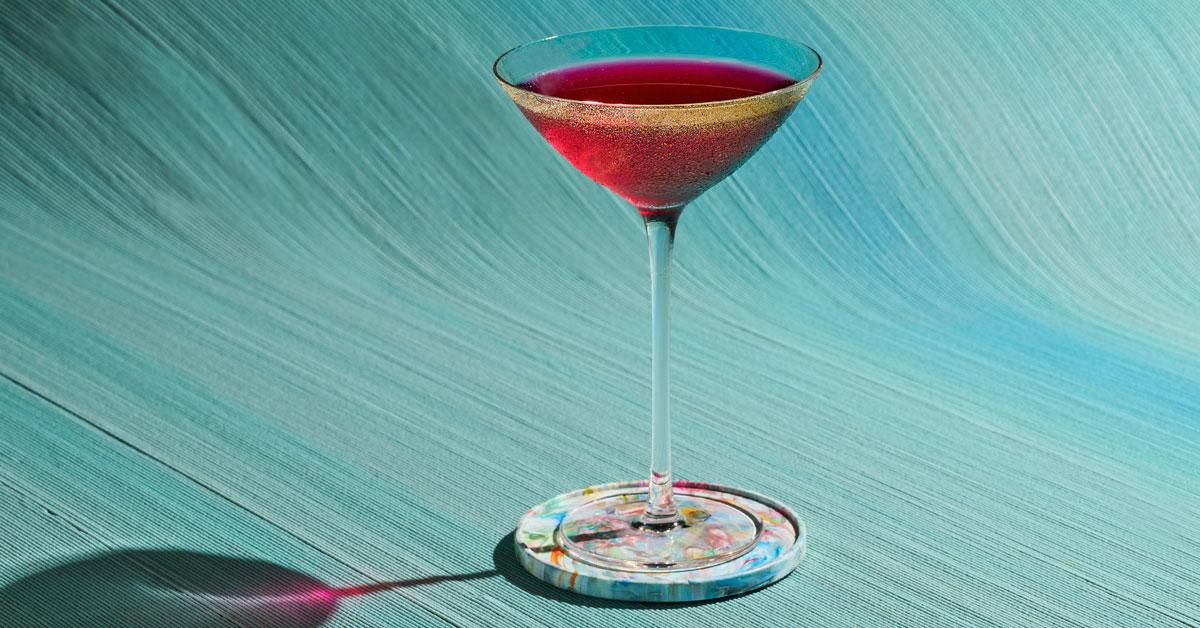It’s not straightforward working a hospitality enterprise as radical as Singapore’s Analogue. In an effort to include sustainability into its observe, the bar executes a very vegan meals and beverage program, conducts fixed assessments of its personal carbon footprint and has eradicated single-use plastics in-venue. To those that’ve change into jaded to the time period “sustainable” within the bar trade, particularly on account of company greenwashing, the idea could look like a pipe dream. However at Analogue, environmental concerns are actually constructed into the bar.
The undulating, wavelike, 3D-printed bartop is made with over 1,600 kilograms of upcycled plastic, for instance, and the encircling tables are comprised of mycelium (a type of fungus); the fixtures function bodily manifestations of the bar’s effort to be extra holistically sustainable.
“‘Analogue’ principally means a factor or particular person comparable to a different,” says co-owner Vijay Mudaliar. “When deciding which course to take the bar in, we explored the present meals methods and determined that change wanted to occur, particularly because it pertains to overfarming, the usage of supplies and accessibility in bars.” Mudaliar strives to make Analogue inclusive in some ways, equivalent to by providing a complete nonalcoholic menu in addition to designing the bar high to be decrease on one aspect, extra readily accommodating wheelchair entry.
The bar’s cocktails discover “future elements,” or “crops that had been resilient to warmth and will develop properly in [it],” says Mudaliar, who sees these elements—like algae, fungi and succulents—as key to sustaining us in a warming local weather. The latter class is central to one of many bar’s most consultant drinks, the Cactus. “The Cactus is about how we will make these elements palatable or, higher but, tasty.”
As a result of agave is part of the succulent household, the cocktail is predicated on Código’s vegetal mezcal. The bottom is mixed with different succulents and cactus-related elements, together with the juices of prickly pear, pink dragon fruit and aloe vera, which get clarified in a centrifuge. “Prickly pear and pink dragon fruit convey that juicy, tangy taste profile to the cocktail, whereas aloe vera brings a beautiful textural profile to the drink,” says Mudaliar.
To carry the subtleties of every clarified juice, Analogue provides a dose of 10 p.c acid resolution made with a mix of tartaric and citric acid powders and water. This method is typical at Mudaliar’s venues, which often steer away from contemporary citrus—other than native fruits equivalent to yuzu—to go for different (and fewer wasteful) types of acidity to steadiness drinks. Rounding out the invigorating combination, the Cactus is injected with a pasilla chile discount that’s comprised of de-seeded peppers, xylitol (a pure sugar alcohol present in crops) and water, including a warming spice and construction to the cocktail.
These parts are then shaken and double-strained up right into a coupe earlier than being garnished with food-grade lime oil, which boosts the fragrant profile of the cocktail. Lastly, a Tajín rim brings an added layer of spice and texture. “The drink itself could be very well-balanced and with a clear end,” says Mudaliar. “And the Tajín actually helps intensify the flavour profile with the correct quantity of salt and spice.”
It’s no secret that striving for sustainability is not any excellent science in an trade that’s inherently a luxurious, however Analogue’s method, exemplified all over the place from the bar high to the liquid within the glass, ought to function a mannequin. With considerate drinks just like the Cactus, Mudaliar shouldn’t be solely capable of supply elements and serve cocktails extra responsibly, however he’s additionally capable of increase consciousness in regards to the significance of creating drinks with the longer term in thoughts, by means of conversations with each employees and company. “As a neighborhood, we have to begin speaking about and researching numerous future meals and crops that we might want to eat sooner or later,” says Mudaliar. “Our ardour is on the coronary heart of our work.”

